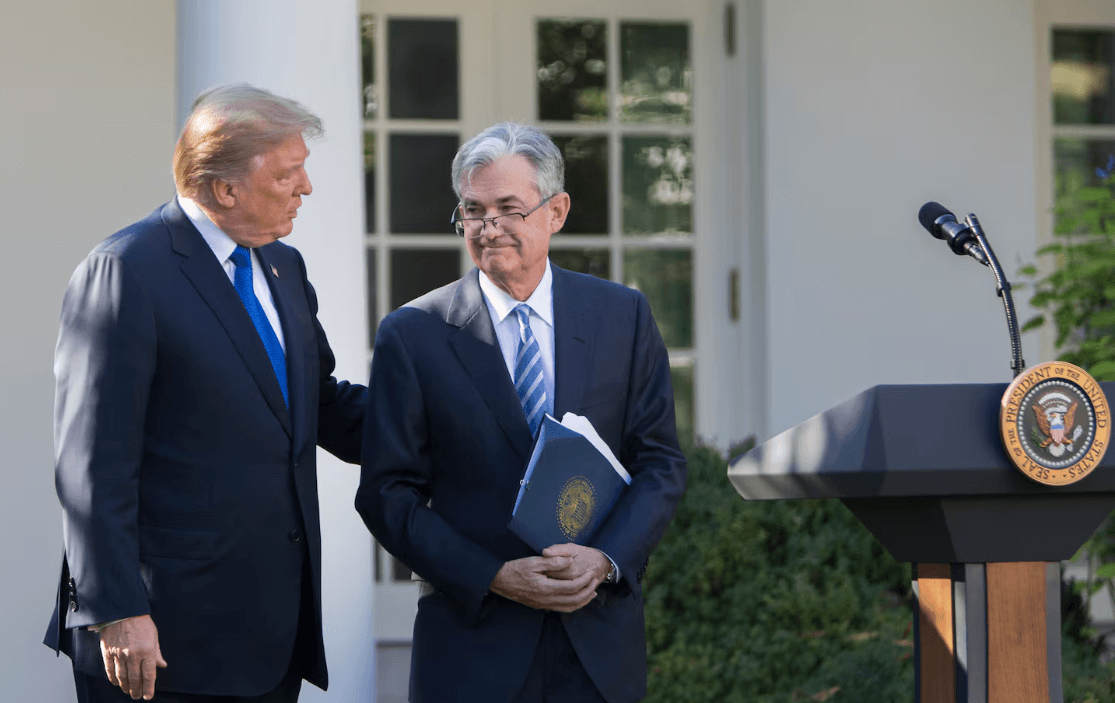随着美联储准备降低利率,人们对特朗普希望影响未来决策的担忧加剧

【中美创新时报2024 年 9 月 18 日编译讯】(记者温友平编译)美联储官员预计将于周三自 2020 年初以来首次下调基准利率,拜登总统无疑希望此举能早点到来,为民主党在选举年提供经济提振。《波士顿环球报》记者吉姆·普赞格拉(Jim Puzzanghera)对此作了下述报道。
美联储官员预计将于周三自 2020 年初以来首次下调基准利率,拜登总统无疑希望此举能早点到来,为民主党在选举年提供经济提振。
但拜登并没有对美联储施加公开压力,即使高通胀——利率超过 16 个月的原因——已几乎回落至正常水平。高昂的生活成本和抵押贷款利率飙升是拜登在退出总统竞选之前支持率低的主要因素。但为了履行恢复道德规范的承诺,拜登没有参与货币政策辩论,以避免动摇公众对央行真正独立且其决策不涉及政治的信心。
唐纳德·特朗普采取了截然不同的做法。他公开表达了对 2018 年加息的不满,诋毁美联储官员“疯了”,据报道,他还考虑采取前所未有的举措,解雇美联储主席杰罗姆·鲍威尔。现在,特朗普表示,如果他重返白宫,他可能会进一步试图影响美联储备受瞩目的利率决定,专家警告称,这最终可能会引发通胀上升,从而损害美国经济。
特朗普上个月告诉记者,他应该对利率决定有发言权,他辩称,“在许多情况下,我的直觉比美联储或主席的人要好。”《华尔街日报》去年春天报道称,特朗普的盟友正在起草削弱美联储独立性的计划。 (他的竞选团队与这些计划划清界限。)一些分析师担心特朗普可能会用一个愿意接受总统影响的人来取代鲍威尔,鲍威尔的主席任期将于 2026 年到期。

“美联储之所以如此设置,是因为在货币政策中,短期收益和长期痛苦之间往往存在权衡,”曾担任奥巴马总统经济顾问委员会主席的哈佛大学经济学家杰森·弗曼 (Jason Furman) 表示。“而过度刺激经济的诱惑总是存在的。”
具有讽刺意味的是,特朗普最终在政治上受益,因为在他担任总统期间,美联储官员拒绝屈服于公众压力。这些加息帮助特朗普担任总统期间的通胀率保持在低位,这是他今年竞选的一个主要话题,此前拜登政府期间通胀率过高。
与拜登一样,副总统卡马拉·哈里斯 (Kamala Harris) 最近表示,她“永远不会干涉”美联储的决策。特朗普最近试图收回他 8 月份的言论,称他只是在谈论公开参与美联储的利率决策。许多人,包括政客和经济学家,已经这样做了。但总统的做法有所不同,特别是如果还涉及幕后压力,马萨诸塞州参议员伊丽莎白·沃伦 (Elizabeth Warren) 表示,她过去两年强烈反对美联储的利率政策,并警告称这些政策会导致经济衰退。
“我公开表达我的观点,而不是秘密打电话,”沃伦说,他周一与另外两名参议院民主党人一起向鲍威尔发布了一封信,敦促将利率下调四分之三个百分点。“唐纳德·特朗普明确表示,如果他认为这对他有帮助,他希望有机会刺激经济。我们不能让总统这样做。”
美联储官员根据经济状况调整基准短期利率,降低利率以通过降低借贷成本来刺激增长,如果价格上涨过快,则提高利率以抑制消费者和企业的支出。
政治不应该发挥作用,这就是为什么美联储理事——由总统提名并经参议院批准——任期 14 年,并且只能“因正当理由”被罢免,这是一个很高的法律门槛。总统还提名一位理事担任主席,任期为四年,但目前尚不清楚总统是否可以合法地将某人从该职位上罢免。
“令人担忧的是,那些经常试图当选的政客的利益,以及经济的利益,即制定不受政治影响的稳定 [货币] 政策,导致了截然相反的结果,”麻省理工学院访问学者、波士顿联邦储备银行前行长 Eric Rosengren 表示。
这不仅仅是一个理论上的担忧。白宫录音显示,理查德·尼克松总统曾向当时的美联储主席施压,要求他降低利率,以改善他在 1972 年的连任前景。低利率后来引发了近十年来失控的通货膨胀。
马里兰大学经济学家 Thomas Drechsel 最近研究了这一事件以及之前总统向美联储施压降低利率的例子,发现它们“强烈而持续地推高了通货膨胀”。
“我认为特朗普的言论令人担忧,因为众所周知,独立的中央银行有很多好处,如果独立性受到侵蚀,可能会带来严重的经济后果,”Drechsel 告诉《波士顿环球报》。
在回答特朗普竞选团队关于澄清他对美联储独立性的看法的问题时,共和党全国委员会发言人安娜·凯利表示,“总统的政策已经影响了利率——哈里斯-拜登经济议程的失败导致抵押贷款利率自 1981 年以来增长最快。”
特朗普非正式经济顾问斯蒂芬·摩尔表示,前总统只是想改善美联储的运作方式。
保守派传统基金会高级研究员摩尔表示:“我认为他认为美联储拥有太多单边权力,美联储没有制衡,我碰巧也大体上同意这一点。”“没有人选举杰罗姆·鲍威尔做任何事,他拥有巨大的权力。”
摩尔说,特朗普任命共和党人鲍威尔担任美联储主席,现在对这一决定感到后悔。摩尔于 2019 年被特朗普提名为美联储董事会成员,但因个人争议而退出。拜登再次任命鲍威尔,任期从 2022 年开始,为期四年。特朗普公开表示,他不会在 2026 年再次任命鲍威尔,但会让他完成主席任期的剩余时间,“特别是如果我认为他做的是正确的事情”。
鲍威尔的美联储理事任期将于 2028 年结束。
一些保守派同意美联储需要改革,包括国会对其利率决策过程的更多监督。但参议院银行委员会成员、北卡罗来纳州共和党参议员汤姆·蒂利斯表示,让总统在利率决策方面拥有发言权太过分了。
“我认为,如果发生这种情况,我们将使这个仍然被认为是全球最独立的经济政策机构之一的机构成为另一种政治工具,”蒂利斯说。“所以我绝对反对。”
华盛顿保守派智库美国行动论坛主席道格拉斯·霍尔茨-埃金指出,总统政府在美联储问题上并非完全不插手。例如,财政部长每月至少与美联储主席共进晚餐一次。他说,不同之处在于总统是否对美联储的利率决定有直接影响。
“我不喜欢总统谈论利率和货币政策,但这并不意味着他们不能对此发表意见。他们可以,”霍尔茨-埃金说。“我认为问题是他们如何处理它。他们是利用办公室的权力来行使控制权和结果,还是只是发表意见?我知道这其中有一条微妙的界线。”
题图:2017 年 11 月 2 日,时任总统唐纳德·特朗普与杰罗姆·鲍威尔在鲍威尔被提名为美联储主席的当天合影。汤姆·布伦纳/纽约时报
附原英文报道:
As Fed is set to lower interest rates, concerns rise about Trump’s desire to influence future decisions
By Jim Puzzanghera Globe Staff,Updated September 17, 2024
Then-President Donald Trump with Jerome Powell on the day Powell’s nomination to chair the Federal Reserve was announced on Nov. 2, 2017.TOM BRENNER/NYT
WASHINGTON — Federal Reserve officials are expected to cut a key interest rate on Wednesday for the first time since early 2020 in a move that President Biden undoubtedly wishes would have come sooner to provide Democrats an election year economic boost.
But Biden has not applied public pressure on the Fed, even as high inflation — the reason rates have been over 5 percent for more than 16 months — has dropped nearly back to normal. The high cost of living and spike in mortgage rates were major factors in Biden’s low approval ratings before he dropped out of the presidential race. But in keeping with his pledge to restore ethical norms, Biden stayed out of the debate over monetary policy to avoid shaking public confidence that the central bank is truly independent and its decisions are apolitical.
Donald Trump takes a much different approach. He publicly vented his displeasure at interest rate hikes in 2018, vilified Fed officials as “going loco,” and reportedly mulled the unprecedented step of firing Fed Chair Jerome Powell. Now, Trump has indicated he might go further in trying to influence the Fed’s high-profile interest rate decisions if he returns to the White House, with experts warning that could damage the US economy by ultimately sparking higher inflation.
Trump told reporters last month that he should have a say in interest rate decisions, arguing, “I have a better instinct than in many cases people that would be on the Federal Reserve or the chairman.” The Wall Street Journal reported last spring that Trump allies were drafting plans to erode the Fed’s independence. (His campaign distanced itself from those plans.) And some analysts worry Trump could replace Powell, whose term as chair expires in 2026, with someone who would be open to presidential influence.
“The Fed is set up the way it is because in monetary policy there’s often a tradeoff between short-run gain and long-run pain,” said Jason Furman, a Harvard economist who chaired President Barack Obama’s Council of Economic Advisers. “And the temptation will always be to overstimulate the economy.”
Ironically, Trump ended up benefiting politically by the refusal of Fed officials to give in to his public pressure when he was president. Those rate increases helped keep inflation low during Trump’s presidency, a major talking point in his campaign this year after the bout with high inflation during the Biden administration.
Like Biden, Vice President Kamala Harris said recently that she “would never interfere” in Fed decisions as president. And Trump recently tried to walk back his August comments, saying he was simply talking about weighing in publicly on Fed interest rate decisions. Plenty of people, including politicians and economists, already do that. But there’s a difference with the president, particularly if it also involves behind-the-scenes pressure, said Massachusetts Senator Elizabeth Warren, who has sharply opposed the Fed’s interest rate policies the past two years and warned they would cause a recession.
“I make my views known, and I do so publicly, instead of in secret with phone calls,” said Warren, who joined two other Senate Democrats Monday in releasing a letter to Powell urging an interest rate cut of three-quarters of a percentage point. “Donald Trump makes clear that he would like to have the opportunity to juice the economy if he thinks it would help himself. And we can’t have a president doing that.”
Fed officials adjust their benchmark short-term interest rate based on economic conditions, lowering it to stimulate growth by making it less costly to borrow, or raising it to restrain spending by consumers and businesses if prices are rising too quickly.
Politics is not supposed to play a role, which is why Fed governors — nominated by the president and confirmed by the Senate — have 14-year terms and can only be removed “for cause,” a high legal bar. The president also nominates a governor to be chair for a four-year term, but it’s unclear if the president legally could remove someone from that position.
“The concern is that the interests of politicians who are regularly trying to get voted into office, and the interests of the economy to have a stable [monetary] policy not influenced by politics result in contrasting outcomes,” said Eric Rosengren, a visiting scholar at MIT and former president of the Federal Reserve Bank of Boston.
It’s not just a theoretical concern. White House tape recordings show that President Richard Nixon pressured the Fed chair at the time to lower interest rates to improve his reelection prospects in 1972. The low rates later helped trigger inflation that roared out of control for nearly a decade.
Thomas Drechsel, an economist at the University of Maryland, recently studied that episode and earlier instances of presidential pressure on the Fed to lower interest rates and found they “strongly and persistently increase inflation.”
“I think Trump’s comments are concerning because it’s well understood that there are strong benefits to an independent central bank, and if the independence gets eroded, that can have bad economic consequences,” Drechsel told the Globe.
In response to a question to Trump’s campaign to clarify his views on Fed independence, Anna Kelly, a spokesperson for the Republican National Committee said, “The president’s policies already affect interest rates — the failed Harris-Biden economic agenda has led to the fastest increase in mortgage rates since 1981.”
Stephen Moore, an informal Trump economic adviser, said the former president simply wants to improve the way the Fed operates.
“I think that he believes the Fed has too much unilateral power, that there’s no check and balance on the Fed, and I happen to generally agree with that,” said Moore, a senior fellow at the conservative Heritage Foundation. “Nobody elected Jerome Powell to anything and he has enormous power.”
Trump appointed Powell, a Republican, to be Fed chair and now regrets the decision, said Moore, who was nominated by Trump to the Fed board in 2019 but withdrew because of a personal controversy. Biden re-appointed Powell for another four-year term that began in 2022. Trump has said publicly he would not appoint Powell again in 2026, but would let him serve out the remainder of his term as chair “especially if I thought he was doing the right thing.”
Powell’s term as a Fed governor ends in 2028.
Some conservatives agree the Fed needs reform, including more congressional oversight of its decision-making process on interest rates. But giving the president a say in interest rate decisions goes too far, said Senator Thom Tillis, a North Carolina Republican who serves on the Senate Banking Committee.
“I think we will render what is still considered globally one of the most independent institutions on economic policy another political tool, if that happened,” Tillis said. “So I’m absolutely against it.”
Douglas Holtz-Eakin, president of the American Action Forum, a conservative-leaning Washington think tank, noted that presidential administrations are not completely hands-off when it comes to the Fed. For example, the treasury secretary dines with the Fed chair at least monthly. The difference, he said, would be if the president had direct influence on Fed interest rate decisions.
“I’m uncomfortable with presidents talking about interest rates and monetary policy, but that doesn’t mean they aren’t allowed to have an opinion on it. They are,” Holtz-Eakin said. “I think the question is what do they do with it. Do they use the powers of the office to exercise control and outcomes or do they just opine? I know there’s a fine line there.”

